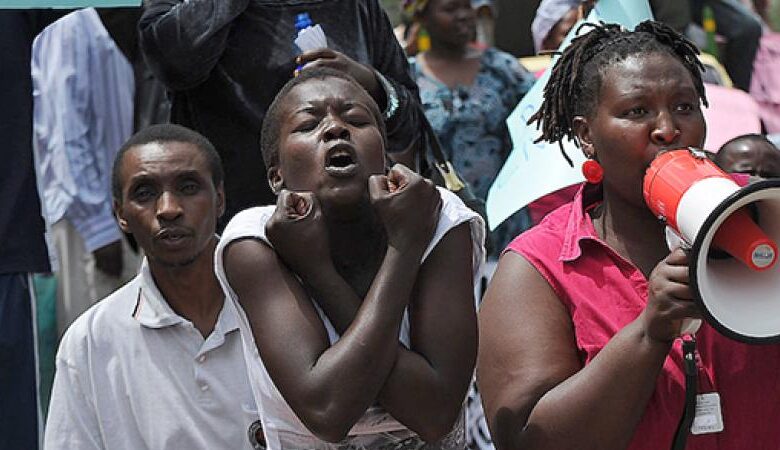The Spread of Anti-NGO Measures in Africa: Freedoms Under Threat

Lessons from National Experiences to Counter Anti-NGO Legislation
NGOs have deployed a mix of strategies to counter or reverse restrictions on their work. These range from lobbying legislators, policymakers, and the international community to organizing protests, filing litigation, building cross-border coalitions, and using technical experts to help develop lobbying strategies, educate legislators and NGO leaders, and prepare draft legislation. Experience shows that outreach to policymakers has been effective when NGO activists coalesce around a common objective and develop a coherent strategy to mobilize varied demarches, including the identification of champions within legislative bodies to carry their message. This was the case in Nigeria, Uganda, and Kenya, where NGOs developed common platforms and coordinated messaging, public education, and lobbying.
One notable success story comes from Nigeria, where civil society drew on support from African networks to mobilize against the 2017 NGO Bill. The example illustrates how local actors can successfully leverage continental organizations to send an unequivocal message of disapproval to legislators who seek to deploy discredited African and international examples as justification for their proposed restrictions. In an effort coordinated by Chidi Odinkalu, who came to the task with his experience as former chair of the Nigerian Human Rights Commission and a prominent member of the Nigerian Bar and international civil society, Nigerian NGOs recruited the participation and support of regional, continental, and global human rights experts. They coalesced around the idea that the bill fell afoul of human rights, leading to the eventual collapse of the legislature’s will to advance the measure. After two readings in the lower house, it failed to proceed from the committee stage after public hearings on December 13 and 14, 2017. It is unlikely to be revived in its current form.
The following factors, drawn from the experiences of the countries surveyed, can be considered key ingredients for effective NGO pushback against anti-NGO measures:
Unity of purpose:
As several cases illustrate, unity of purpose among NGO actors serves to advance collaborative efforts even where cleavages exist within civil society. In Nigeria, as in Uganda and Kenya, NGOs developed coherent, multifaceted strategies involving marches, lobbying, interventions in the media, and written submissions and representations to legislative and policy bodies, with each component of civil society playing a role. The degree to which basic civil liberties are respected in a country has a bearing on whether NGOs can organize in this way.
Capacity:
The capacity of civil society to mobilize expertise for the analysis of legal texts and policies, the formulation of responses, and the preparation of their own draft policies and legislation is critical to the success of such activities. Several international organizations, notably ICNL, have added immense value to the work of national civil society. In multiple countries, ICNL has provided expertise to support local coalitions’ engagement with legislators and policymakers and to formulate interventions.
Cross-border learning:
Ohaeri’s role in Sierra Leone, where she supported NGOs engaging with policymakers, constitutes a positive form of cross-border collaboration that extends to sharing experiences on how to run successful campaigns to counter repressive laws. The ICNL has led similar initiatives in several countries where new policies were under consideration in 2018.
The elements below are not fully within the control of NGOs, but they may still determine the success or failure of pushback against anti-NGO campaigns:
Vibrancy:
The vibrancy of NGOs matters in countries where restrictive measures are initiated: It determines whether the groups can marshal favorable public opinion, assemble resources, and recruit allies within and outside government to successfully defeat legislative initiatives, or at the very least exclude the most destructive measures from the agenda. Experience shows that where civil society is vibrant—usually in relatively strong multiparty democracies like Nigeria and Kenya, or where for other reasons the government is somewhat responsive to public opinion, especially in aid-dependent countries—NGOs stand a chance of forcing government to reverse course. In relatively closed societies dominated by single parties or the military, NGOs lack avenues to voice their concerns and the resources necessary to mobilize a coherent strategy. In such countries, press freedom might be restricted or under serious threat.
Legitimacy:
As the cases of Kenya, Nigeria, and Ethiopia illustrate, the legitimacy of the leading NGOs plays a critical role in blunting state-led accusations and propaganda that seek to portray NGO leaders as lacking in probity, unfit to run organizations, and valid targets of government intervention. In Ethiopia, official propaganda was extremely effective in painting human rights and governance NGOs as unaccountable and NGO leaders as elitist, self-serving, and possibly unpatriotic agents of foreign powers. But in Kenya, the invalidation by courts of executive orders to freeze accounts of leading NGOs undercut the government’s campaign against them. The groups’ advocacy and visibility in Kenyans’ search for justice regarding the postelection violence of 2007–08 marked them out as targets for the government, but also as victims of persecution in the public eye. Lack of accountability is a common accusation leveled against NGOs in countries where anti-NGO measures have been adopted. In some, such as Sudan, NGO leaders have faced persecution, been detained without trial, or been tried on trumped-up espionage charges that often collapse under the slightest judicial scrutiny. Detractors of NGOs find it more difficult to dismiss groups that are rooted in communities, practice financial probity, demonstrate selflessness in their service, generate local solutions, and do not rely entirely on foreign resources.
Use of courts to dramatize the NGO cause:
The cases of Kenya, Malawi, Angola, and Zambia illustrate the important role courts can play in pushing back against anti-NGO measures. In the judiciary, NGOs may find an important institutional counterweight against executive and legislative action, as well as space to dramatize a vital cause before a national and global audience. Litigation has been used to good effect—albeit in limited fashion—to declare unconstitutional a new framework law on procedural grounds (Angola), to prevent amendments to an existing law that would have hiked registration fees (Malawi), to stop the deregistration of NGOs and force the government to negotiate with such groups (Zambia), and to order the executive to implement a progressive framework law and protect NGO actors from executive orders freezing their funds (Kenya). The appendix to this report sets out a structured litigation strategy to protect freedoms of association and assembly based on the limitation of rights framework, which has yet to be deployed in any of the situations surveyed. Experience shows, however, that judicial recourse works best when it forms part of a larger strategy developed by NGOs and their supporters.
Political will:
Several experiences—notably in Uganda and Ethiopia—demonstrate that governments’ willingness to genuinely engage with civil society and work collaboratively on legal formulations that preserve freedoms while ensuring that state agencies have the tools to address serious security threats is a sine qua non for successful pushback. In Uganda, official receptiveness to at least some of the ideas proposed by NGOs led to the exclusion of certain provisions before the draft law was passed. In Egypt, by contrast, the government’s stonewalling and refusal to meaningfully consult with NGOs, following the adoption of Law 70 in 2017 within two days of its introduction in the legislature, rendered NGO efforts fruitless. When the government came under pressure not to implement it, the law was embargoed for six months, but it was still ultimately approved by President Abdel Fattah al-Sisi. In Sierra Leone, where at least part of the legislative process was shrouded in secrecy, NGOs were excluded from the final stages following disagreement on key provisions during earlier government-NGO deliberations. As of December 2018, the newly elected government under President Julius Maada Bio was reportedly open to revisiting the debate on the NGO regulations.
Source link

